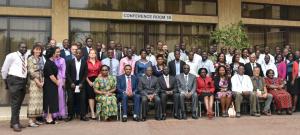Uganda conducts Joint External Evaluation of International Health Regulations (2005) core capacities
Uganda, with support from the World Health Organization (WHO), is hosting a five-day Joint External Evaluation (JEE) meeting to review and validate the progress made by the country in building the International Health Regulations (IHR 2005) core capacities and their implementation.
On voluntary invitation by the Ministry of Health (MoH), the JEE team together with national experts will review progress made in 19 technical areas highlighted in the IHR (2005) as well as the Global Health Security Agenda including IHR coordination, laboratory services, biosecurity and biosafety, preparedness, reporting, immunization, workforce development, emergency operation centers, medical counter measures, among others. The JEE team will further review challenges faced as well as identify gaps and together agree on priority actions for improvement where needed. These actions will be further developed into an improvement plan that the country will implement in the coming years.
Previously, countries conducted annual self-evaluation and reported to WHO, however in its report transmitted to the 68th World Health Assembly by the Director-General of WHO, the IHR Review Committee on Second Extensions for Establishing National Public Health Capacities and on IHR recommended “options to move from exclusive self-evaluation, to approaches that combine self-evaluation, peer review and voluntary external evaluations involving a combination of domestic and independent experts”. Thus, the JEE tool and process were developed to address this recommendation.
The Minister of State for Health in charge of General Duties, Hon. Sarah Opendi opened the meeting highlighting the importance of the JEE to the health sector and the country at large. She further affirmed Uganda’s cooperation saying, “Uganda believes in the JEE and upholds the principles of transparency and accountability, evidenced in the periodic notifications to WHO during emergencies.” She further added that JEE would help Uganda build capacity required to quell emergencies.
The Coordinator for IHR Monitoring, Procedures and Information Unit at the WHO headquarters, Dr. Stella Chungong commended Uganda for voluntarily allowing to take on the JEE. She explained the process that will be used in the JEE and highlighted that the evaluation would review progress made in 19 technical areas. She further noted that JEE receives immense support from stakeholders and donors across the globe and as such it will be instrumental in informing actions to address gaps in the IHR (2005).
The Acting WHO Representative in Uganda Dr. Abdoulie Jack said, “infectious diseases travel easily, they find and locate the weakest part of our health systems and manipulate them; thus Global health security is a concern for all of us.” He further acknowledged the progress made by Uganda in building most core capacities adding that there is, however, still more to do. He noted that Uganda had already undertaken a similar Global Health Security Agenda (GHSA) assessment three years ago that covered 11 of the 19 areas being reviewed and hence this review would serve as a follow up assessment for the 11 areas. He urged all the IHR stakeholders to be actively engaged in this important process and in implementation of the recommendations to enhance national and global health security.
The Joint External Evaluation is collaborative and multi-sectoral, seeking to involve all IHR (2005) stakeholders and partners. It is a component of the WHO IHR (2005) Monitoring and Evaluation Framework and is implemented in full concordance and collaboration with the Global Health Security Agenda and the World Animal Health Organization’s (OIE) Performance of Veterinary Services (PVS) Pathway. It is not fault finding but is forward looking, with the ultimate expected result being an improvement plan that when implemented will enable the country to build and sustain the IHR (2005) core capacities, and thus contribute to Global Health Security.
From the exercise, the JEE team will present the findings and recommended priority actions to all IHR stakeholders in the country. The recommendations will subsequently inform the development of an action plan for attainment of all IHR core capacities by the country.




